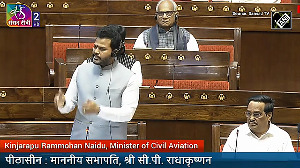We must not allow a scenario in which a handful of countries get automatic access to IMF credit lines while others don't.
The crisis that has threatened the global economy since August 2007 has unfolded in an accelerating succession of phases.
October's phase was the spread to emerging markets.
A key step in fighting what could become a severe worldwide depression is making massive credit lines available to most emerging-market economies, which have been experiencing the repercussions of the deleveraging and associated credit crunch in the advanced economies.
This issue will be central to the November 15 meeting in Washington of leaders and ministers of the Group of 20 major industrialised and developing nations.
Almost all emerging-market economies are running into financing difficulties. The problem has been getting worse as big, internationally active banks hoard liquidity, as capital is repatriated to financial centers and as rich countries' gross domestic products contract.
Some currencies have lost 30 to 50 per cent of their values against the dollar, upsetting corporate balance sheets.
The risk spreads in bond markets have risen steeply, and access to loans or loan rollovers has become increasingly difficult to get for sovereign and non-sovereign borrowers from emerging-market economies.
Many have argued for concerted action involving large International Monetary Fund loans accompanied by credit lines from the European Central Bank as well as the central banks of Japan, the United States, China and some of the reserve-rich Gulf states.
The IMF announced a plan on Wednesday to create a short-term liquidity facility designed to channel funds quickly to eligible emerging markets with 'track records of sound policies, access to capital markets and sustainable debt burdens,'
as well as policies that 'have been assessed very positively by the IMF' in its most recent discussions with those nations.
And the Federal Reserve has announced new or enlarged swap facilities that Brazil, Mexico, Singapore and South Korea will be able to access.
Eligibility criteria to these credit channels and how these will be perceived are critical. Mexico's initial reaction to the IMF plan, for example, was that it did not need it, a response probably facilitated, at least in part, by the swap line
made available by the Fed.
What should not be allowed to emerge is a scenario in which a small group of countries that the IMF and rich countries' central bankers deem to have good track records have automatic access to large credit lines, while countries that are deemed riskier or that have less systemic importance or political clout have to apply for more traditional IMF programs, which take much longer to put in place and for which more extensive and intrusive conditions would apply.
An 'all or nothing' categorization will create serious political tensions.
Of course, it is not feasible or reasonable to open automatic access to what could be hundreds of billions of dollars of credit to a large number of developing countries without any eligibility criteria.
But selecting only a few for such access and asking many others to engage in protracted negotiations will create great stigma for those countries left out and could, in fact, push them into crisis even faster.
It will also make it politically difficult for these governments to engage in such negotiations if other countries have immediate access to assistance from the IMF or central bank swaps.
It would be more constructive to expand access to the new IMF lending facility to a greater number of countries with reasonably good economic policies over the past few years.
Broadening access could be achieved by an interpretation of the announced eligibility criteria that makes it clear that this facility is not aimed at a select few.
In the end, decisions will have to be made case by case and should reflect the widespread need for varying doses of fiscal stimulus in the face of collapsing demand for exports and declining private expenditures.
IMF resources could provide up to about $200 billion, but global needs are estimated at $500 billion to $800 billion. IMF loans, then, will have to be complemented by central bank credits, hopefully including credits from China and some of the Gulf states.
A way should be found quickly to associate new actors such as China in a much more substantial way with the design and decision making relating to these facilities, pending more fundamental reforms in IMF governance.
Emerging markets cannot be easily or simply labeled as those with good policies and those with bad policies.
There are degrees of strength in policies and prospects, and a comprehensive approach will have to recognize the continuum rather than versimplifying and opening the way for dramatic and politically sensitive ll-or-nothing choices.
A massive, comprehensive effort is needed immediately to extend support to hundreds of millions of people who bear no responsibility for creating the crisis that threatens their jobs and livelihoods.
There must be decisive action on an imaginative design - not months from now but in the next two weeks.
The author is executive head of the UN Development Program. He was minister of economic affairs and treasury of Turkey in 2001 and 2002






